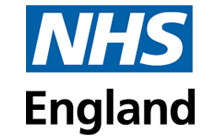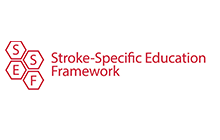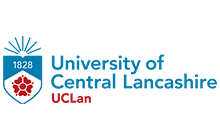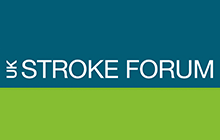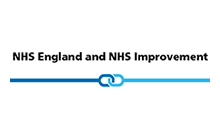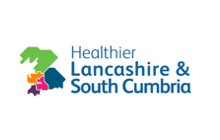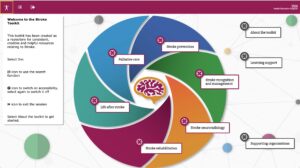- About the Stroke programme
- Stroke toolkit
- Stroke prevention
- Stroke rehabilitation and care
- Stroke rehabilitation for the non-registered workforce
- Stroke rehabilitation for the registered workforce
- More information
- Meet the FACTS team from University of Central Lancashire (UCLAN)
- Meet the Stroke Awareness Training team
- Meet the Health Education England (HEE) team
- Meet the elearning for healthcare (eLfH) team
- How to access

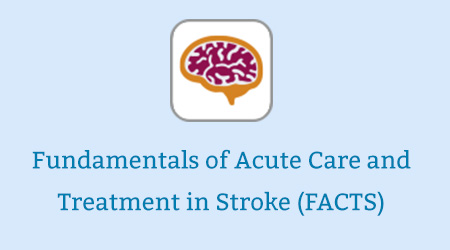
About the Stroke programme
Although stroke is the leading cause of adult disability and the fourth largest cause of death in the UK, it is estimated that 70% of strokes could be prevented and better managed.
The Stroke elearning programme has been designed to provide an overview of stroke care across the entire pathway and promote better patient care, by providing all health and social care professionals and multidisciplinary teams with the appropriate level of knowledge, skills and experience they need to deliver effective stroke prevention and care to people with stroke, and at risk of stroke.
Stroke toolkit
The Stroke Toolkit aligns to the NHS Long Term Plan and provides learners with a comprehensive list of online resources, that can be used in conjunction with the Stroke-Specific Education Framework, to support workforce upskilling, training and development.
Stroke prevention
The Stroke Prevention programme is aimed at GPs, pharmacists and non-specialist clinicians, who care for patients with atrial fibrillation. The module aims to improve participants knowledge of how to assess a patient’s stroke risk and their suitability for anticoagulation therapy, as well as educating participants on how to initiate and monitor anticoagulation therapy, including patient counselling.
Stroke rehabilitation and care
Stroke FACTS elearning
The Fundamentals of Acute Care and Treatment in Stroke (FACTS) elearning resource provides a comprehensive introduction to stroke care. It was developed by the Stroke Research Team at the University of Central Lancashire as part of a research project. Funded by Health Education England North West, the research project explored the stroke-specific content in undergraduate healthcare professional degrees.
The final resource, informed by the Stroke-Specific Education Framework (SSEF) and best practice guidelines, was evaluated with students and practicing healthcare staff at bands 2 to 6, who found the resource to be an effective addition to their stroke-specific training.
FACTS provides knowledge relating to the 16 elements of the stroke care, as outlined in the SSEF, from awareness raising to participation in the community. After completing the 2 sessions, learners will have a factual level of knowledge (SSEF level 2) regarding the fundamental aspects of stroke care provision.
Stroke rehabilitation for the non-registered workforce
The Stroke rehabilitation for the non-registered workforce session explains what a stroke is, what difficulties can arise because of stroke and what management strategies can be offered to support the stroke survivor in their rehabilitation.
This session consists of 6 videos covering the topics of:
- Mood
- Cognition
- Communication
- Swallowing
- Positioning And Manual Handling
- Functional Independence
Stroke rehabilitation for the registered workforce
This learning, comprising of 2 sessions, aims to build on knowledge gained from the non-registered workforce session. It is designed to demonstrate that rehabilitation should continue outside of individual therapy sessions, if stroke survivors are to achieve the best possible outcomes.
Session 1 focuses on how you can support stroke survivors with eating, drinking, communicating, creating the right therapeutic environment and the importance of good mouthcare.
Session 2 focuses on your important role in 24-hour rehabilitation and how you can support stroke survivors with their upper limb, positioning, transferring, decision making and develop an understanding of perception and insight and how this can affect a stroke survivor.
This learning is intended for the registered workforce which includes nursing staff and those in allied health professions.
More information
National Clinical Guideline for Stroke
Developed by the Stroke Association, The National Clinical Guideline for Stroke defines recommended best practices within stroke care. In a first for the guideline, it now applies across the whole of the UK and will also be used in the Republic of Ireland.
This guideline provides much-needed updates to recommendations on rehabilitation, psychological and emotional support, and return to work services, amongst many other changes. An accessible version of the guideline is also available, outlining what patients should expect from their stroke services.
Stroke-Specific Education Framework (SSEF)
The Stroke-Specific Education Framework (SSEF) is a nationally recognised framework, developed with funding from the Department of Health, which details the knowledge and skills that health and social care professionals need to care for their patients appropriately and compassionately.
SSEF Toolkit
The SSEF Toolkit enables learners to reflect upon their knowledge and skills by developing a personal profile and compare their personal profile with nationally agreed standardised role profiles. Learners can identify new learning needs and relevant training, explore the curriculum and advertise stroke-specific education and training opportunities.
Free to all learners, the toolkit supports the continued professional development of the stroke workforce, to ensure patients receive safe and effective care from highly trained healthcare professionals.
You can read more about the SSEF on the website.
Stroke Association
The Stroke Association provides resources for health and social care professionals and multidisciplinary teams, to effectively support stroke survivors and their families with information about stroke.
Population Wellbeing Portal
The portal is a collection of elearning resources to support health and social care professionals and multidisciplinary teams in preventing illness, protecting health and promoting wellbeing.
More information on Stroke by Health Education England can be accessed on the website.
Meet the FACTS team from University of Central Lancashire (UCLAN)

Dame Caroline Watkins
Professor of Stroke and Older People's Care
Colette Miller
Research Fellow
Danielle Christian
Research Associate
Joe Spencer
Research Assistant
Rachel Georgiou
Senior Research Fellow
Liz Boaden
Senior Research Fellow
Meet the Stroke Awareness Training team

Ruth Ten Hove
Assistant Director, Chartered Society for Physiotherapy
Helen Vernon
Speech and Language Clinical Lead, Morecambe Bay Hospital Trust Stroke Rehabilitation Lead for the L&SC ISNDN
Meet the Health Education England (HEE) team

Adrian Brooke
Deputy Medical Director (Workforce Alignment)
Jonathan Corne
Postgraduate Dean East Midlands
Mohamed Sadak
Programme Lead NHS Long Term Conditions (Cardiovascular, Respiratory and Stroke)
Folake Olubajo
Business Manager Workforce Alignment
Jon Cooper
Stroke Clinical Lead, Postgraduate Dean Yorkshire and the Humber
Rana Mohamed
Senior Project Manager, NHS Long Term Conditions (Cardiovascular, Respiratory and Stroke), Health Education England (HEE)
Joelle Whenham-Bossy
Project Manager NHS Long Term Conditions (Cardiovascular, Respiratory and Stroke), Health Education England (HEE)
Paul Gledhill
Senior Project Manager, Directorate of Education and Quality
Felicity Callow
Student Placement, Health Education England (HEE)
Meet the elearning for healthcare (eLfH) team

Sarah Gray
Programme Manager - Technology Enhanced Learning, NHS England
Marnie Greenrod
Programme Manager - Technology Enhanced Learning, NHS England
Dave Beardmore
Senior Project Manager - Technology Enhanced Learning, NHS England
Alex Cleary
Learning Designer - Technology Enhanced Learning, NHS England
Runam Prasad
Lead Learning Designer - Technology Enhanced Learning, NHS England
Alan Campbell
Learning Designer - Technology Enhanced Learning, NHS England
Rasmi Chavda
Graphic Designer - Technology Enhanced Learning, NHS England
How to access
In order to access the Stroke programme, you will need an elfh account. If you do not have one, then you can register by selecting the Register button below.
To view the Stroke programme, select the View button below. If you already have an account with elfh, you will also be able to login and enrol on the programme from the View button.
The Stroke programme is also available to NHS healthcare staff via the Electronic Staff Record (ESR). Accessing this e-learning via ESR means that your completions will transfer with you throughout your NHS career.
Further details are available here.
Not an NHS organisation?
If you are not an NHS health or care organisation and therefore do not qualify for free access elfh Hub, you may be able to access the service by creating an OpenAthens account.
To check whether or not you qualify for free access via OpenAthens, you can view the eligibility criteria and register on the ‘OpenAthens’ portal.
Registering large numbers of users
If you are a HR, IT or Practice Manager and would like to register and enrol large numbers of staff within your organisation for access onto the Stroke programme, please contact elfh directly.
Organisations wishing to use their own LMS
For HR departments wanting to know more about gaining access to courses using an existing Learning Management System please contact elfh directly to express interest.
More information
Please select the following link for more information on how to use the elfh Hub.


